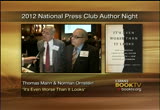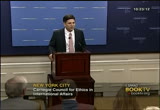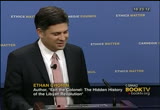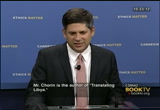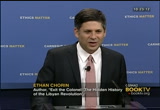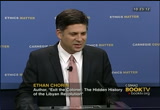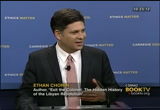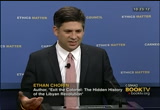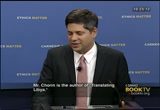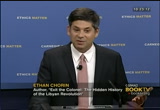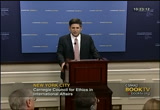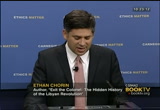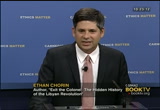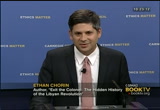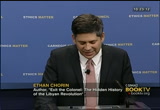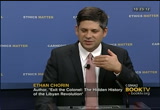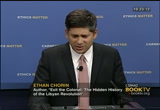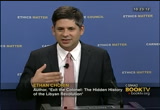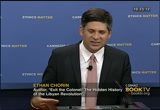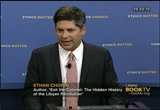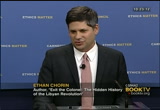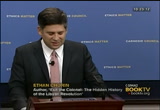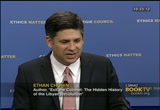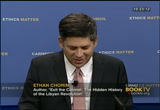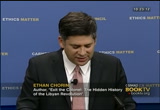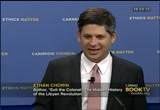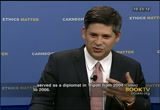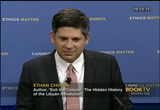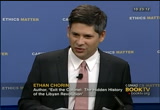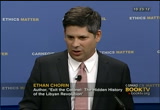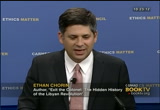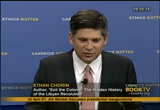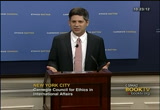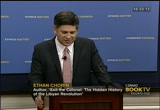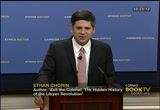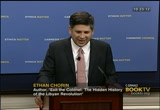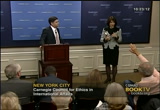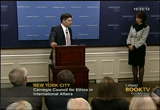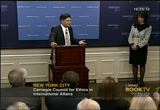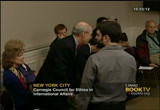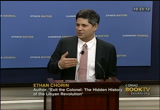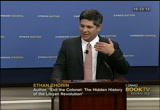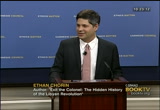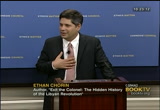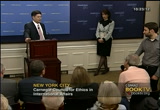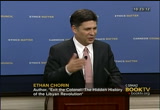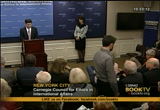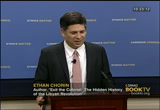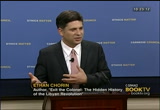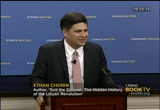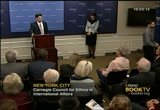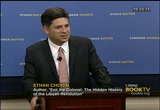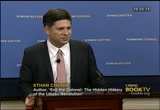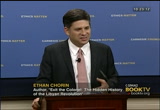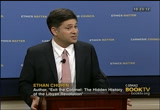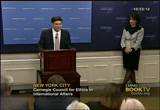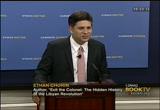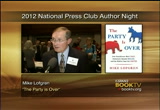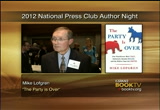tv Book TV CSPAN December 22, 2012 2:00pm-3:00pm EST
2:00 pm
2:01 pm
early -- with chilly i think a couple of weeks after the beginning of the revolution about the idea of writing a book about a series of events that was literally just under way. it was a bit of an issue trying to come up with a book proposal because we have absolutely no idea how this was going to end. but the end was reasonably clear , i thought. the beginning was, as far as their operations within the u.s. and the west and libya was a time which i had lived as a junior diplomat from 2004-2006 when a small group of us were sent to tripoli to basically laid the foundation for picking
2:02 pm
the embassy. i, you know, spend a lot of time in the middle east, sometimes i wonder whether i should a steady japanese like when i was in college because the degree of change ability, it's a drama continuing, but there's a certain something about the region and the people and the disparate culture which is really quite gripping and the more that you get into it the more you become passionate about it. i'm simply very passionate about libya. essentially some of the reflections that i heard, the commentary that was made to me while i was posted in libya were basically driving desire to write this book because a number of people came up to me. very surprising in different contexts, different taxi
2:03 pm
drivers, police to make lots of money as middlemen between the regime and the private sector, former mark -- former monarchy, people who have been parliamentarians' back in the 60's said, look, we understand that there is this preparation going on. you realize that if you -- this is your time to pin their regime and the colonel to the wall. if you don't express what you want from this and have a clear and cool things will not workout well, and we're willing to say that even if we pick -- poised to make a lot of money and of this. this is not the view of everyone, but these kinds of hushed warnings that resonated very strongly with me. and are in some ways going to explain or increasing the
2:04 pm
explain some of the news a we are hearing in retrospect about what actually went on during it some time of the gaddafi regime. the book, there were basically four takeaways, four main points that i try to make. one of them has been brought into profile by the presidential debate in the whole issue of what happened in benghazi which is the myth of bolivia's irrelevance to u.s. policy. over the course of, if you go back to the foundations of the libyan state in 1951, you know, the u.s. relations with libya have been -- the u.s. has looked at libya as something of an a strange creature that we could use for certain -- as a piece of the strategy that had to do with
2:05 pm
the region as a whole, but was never really looked at as -- the relationship was never seen as an object in and of itself. you could start off with their relationship with the soviets, the eisenhower doctrine and the united states to siring to push back soviet influence. libya was desperately pleading for u.s. attention back in, for eight tickets of to get to the list and on its own feet. this was before the discovery of oil. the u.s. kind of took, welcome here not as important as egypt, for example. we will think about that. the result was that the prime minister at the time basically devised the plan to court the soviets and see if he can grab the attention. the next major event was libyas and the successful bid of
2:06 pm
qaddafi said change the way the oil pricing was conducted by squeezing the independent oil companies occidental petroleum first and foremost in to changing the system whereby there would be a 5050 split and basically controlling interest by u.s. oil companies and libyan oil. and that is the consequence of that which has come through to this day in terms of increasing the power of nickel states, saudi arabia in particular. so libya and fast forward to the arabs bring, you know, very important point is that the deal became a sort of, you know, obama in 20002-9 delivered his famous new beginning speech. he said he would stand with the arab people against tyranny and made a number of very strong
2:07 pm
statements which probably was expecting to be called upon so soon. dino, at the time you have cereal looking as the sequential arab revolts came, there were very few places where the united states had uneasy or even a conceivable h to come in and do something where the consequences were not dramatic or at least there could be a positive. egypt was a longtime ally and banker in the middle east, supportive of israel. tunisia was a little better, but by that point it had crossed the threshold. syria, the comparisons with libya are quite, you know, it's very different. it's multi sectarian society with lots and lots of connections to other plot powers .
2:08 pm
lebanon, israel, disrupting or changing that relationship could have all sorts of consequences which are unknown. so libya presented -- was unique in that the libyans have a popular uprising. there was a program that had been put forth by a small group of people who had put themselves forward as sort of first unofficial but increasingly official spokesman of the libyan people. this was an opportunity for essentially president obama and the united states that makes some good on much of the content of the 2009 speech which is very important. i think people are potentially losing sight of that. the second take away is the question of intelligence and what we have known about what is
2:09 pm
going on in libya for the past 42 years and is remarkably little. you know, this is, i think also a symptom of a particular country that goes into it sanctions, blackouts because once camino, that happens you basically institutionally lose some knowledge which is not regenerated as time goes on. i think when situations change and their need to be some repository of knowledge upon which you can try to figure out what's going on, it's not there because the place has been off the map for quite some time. and i think that lack of institutional knowledge complicated the u.s. response to what was going on, not only in libya, but other countries, arabs bring countries. the third interesting thing i think is very interesting is the
2:10 pm
issue of u.s. and libyan being actually he straw that broke the camel's back. in this sense that, you know, qaddafi made a series of agreements with the united states which he thought was going to save his regime. there were a number of consequences of those decisions, both for the u.s. and libya, which did not turn out exactly as he wanted. i'll go into that in a little bit more detail later. the nature of the agreement that was made between the united states in particular follow-through, which relates to the point side made before which is now is the time, there's a success and libya.
2:11 pm
my opinion and certainly other shared, but i think that this is one of president obama's major successes. the danger is that once as time goes on, as the political vacuum moves forward and grass ridge process these move forward, if they don't move forward fast enough you're going to have a major problem. you can see evidence of that. i think that in general i continue to be optimistic about libya's future. the country is a very small population, 6 million people. a tremendous wealth, 78 billion in proven reserves, back to there prewar production. one of the most striking things this new political transitions
2:12 pm
that have taken place in terms of going from a non elected it representation and the articulation of goals to an elective -- a transitional government and in an elected government up on the national and the local level. you don't see that elsewhere, at least not as in a striking as fashion. and the rest of the book i talk quite a bit about the personality of qaddafi and what motivated him. many people argued that the personalities of the dictators themselves really don't matter. in the case of libya i think does not quite true. qaddafi was a near kerrville intelligence person in math certain fixations. i tried to be diplomatic here.
2:13 pm
but they're is a lot of strangeness was motivated his behavior in ways which i think were so bizarre that many of the people who looking at this from the u.s. policy side, not in a way where customers to thinking about things. that posed problems. after 1986 bombing in benghazi and tripoli qaddafi was rumored to have gone into a tremendous fun for several months. if you fast-forward, this is something that looks like it happened after the beginning of the revolution. so and that mentality seems to have provoked an incessant or very deep-rooted feeling the heat needed to somehow both
2:14 pm
retaliate and once we tally its series owner himself. if you look at the major events in u.s., libya, with the relations can't the years after the late 80's and now you have the lockerbie bombing which was a seminal event in what would become next, plunging libya into a time of extended sanctions. so the -- you know, that -- everything, all of the negotiations with the west happened after that point were somehow, once he was fingered for the lockerbie, that criminal act, everything that was done, the bulgarian nurses case is one
2:15 pm
example. we could talk but that a bit later, with their or a number of actions that were taken which were designed in some way to mitigate or deflect responsibility for that act in to try to get himself back into the good graces of is not his own people and the outside world . so that's -- i would like to death talk a little bit about in terms of the actual disintegration of the regime, again, the lockerbie bombing was a tremendous marker in the sense that it produced -- it created a time in which there were essentially, you know, the place was hermetically sealed. qaddafi was left to stew in his own juices. oil exports, you know, revenues
2:16 pm
declined greatly. unable to purchase weapons to the same rate. you know, his real range of maneuver in the outside world was greatly curtailed which personally affected him greatly. affected the people around him who wanted to be able to travel to the spend their, you know, the income that they got from his patronage. that environment created an atmosphere as well and which the islamic opposition take greater group and was essentially cards become more and more virulent. the number of events which because of our lack of understanding of what was going on in libyan would in retrospect signal, you know, to people who are watching this that things are not going well. essentially the people work getting increasingly frustrated
2:17 pm
with qaddafi and had the potential to the explode. you had the -- another event, the massacre in 1996 in which 120050 people were killed. this was by -- under the supervision allegedly of the head of internal intelligence. this was a very important thing because the victims of that massacre were primarily political prisoners and from the eastern part of the country. the east, you know, in a very tightly knit tribal society, this act of that magnitude basically created a cascading resentment which came to the haunted qaddafi basically. this was -- that was a major event in creating resentment against the regime.
2:18 pm
by 1997 benghazi was essentially in a state of siege. there was a very large barakat was a center of the town known as the fairest of qaddafi. this was basically occupied, in many degrees occupied territory which explains a bit more of this east-west distinction which is very important to improving that the spark of the rebellion. another -- and perhaps the most critical inflection point in this was the -- in it the ultimate downward trajectory of qaddafi was for the u.s. war because once this was under way, you know, the stage was set for two competing and rather disingenuous narratives, one
2:19 pm
told by qaddafi to his old people, and one told by the bush administration and the west to its people. the west, the story put forth by -- on our side was that qaddafi was essentially unrepentant up until the point above lockerbie and other terrorist activities and his weapons of mass destruction until the point where he saw some st. paul of the spiral. and the problem, of course, was that qaddafi had been suing for peace with the u.s. since -- documented efforts dating back to 1992 just after the sanctions are starting to be -- the un sanctions started to kick in. and there were at least ten documented temps to get the
2:20 pm
international community's agreed to let him back in, to create the conditions. so that narrative is not quite accurate. the question of weapons of mass destruction as well, qaddafi had a tendency for many years to collect large amounts of weapons which were either defective for which nobody knew how to use. and this was not -- again, i'm not a nuclear expert, but i certainly think i've read most of the public sources on this subject. and the consensus that i see -- well, there is no consensus, but they're is a strong feeling among many very prominent scientists and observers that qaddafi was very far from a nuclear weapon and further, the u.s. really wasn't very
2:21 pm
concerned about qaddafi, which is the other thing. qaddafi believe that constantly he was the focus of u.s. attention or should be and that, you know, he must do something to escape this, what would undoubtedly be a very unpleasant consequence for himself. to the libyan people, of course, the concept of linkage came in in which qaddafi would use this to say, look, i have managed to pull a rabbit out of a hat. move down to sanctions for eight plus years depending upon which into your talking about. here is this -- i manage to get myself out of it. libya will be a bus for the kutcher moving forward. there were some aides who had moments of indiscretion and confessed that they thought there were all stunned that the agreement took place.
2:22 pm
they never believed that this could actually happen. of course the u.s., you know, here is where one of my major arguments in the book was that the regime, the administration of the united states was a leader at this point to try to find a positive result from the barack war that they were willing to a basically leave it and to gain information that would lead to a full and counter-terrorism policy. and as a bonus, the destruction counter proliferation issue. all this stuff was fantastic. we could leave the details until later which was, in my view, huge mistake. if you look at the lockerbie agreement itself which dictated the terms under which the payments to the victims of pan
2:23 pm
am one of three or dispersed committee to those things degree itself, it was initiated between lawyers and the family side and the libyan government. that agreement made it very clear that moneys would not be transferred and last certain diplomatic objectives had been reached. essentially in typical fashion turned his worst enemy, his greatest anti lobbied into one of his greatest tools for getting out of the mess that he was in. and this process continue to many other incidents which i talked about at great, great length of the book. so essentially you have these divergent narratives, the other
2:24 pm
issue is that in fact as we were trying to -- the issue of human rights seemed to take a great backseats to the exigencies of those other goals that i just mentioned. and in retrospect, as information came out about the rendition programs that were run by the cia, for example, to bring individuals to libya, deliver them for torture, you know, if you're looking at trying -- a policy of trying to put pressure on qaddafi toward economic reform and improve human-rights, all he has to do is say, look, you're giving us to the public what your doing. it undermines the premise that actual reform and human rights are one of your major goals. a very interesting portion of
2:25 pm
the story, i think, is the question of the makeover. that's the title of one of the chapters which is once both parties, libyans and the u.s., i agree that this was the path going toward, a story, i join story had to be created. and, of course, qaddafi was not exactly the best character actor for reform. so somebody else needed to be found to play that role. and you better than his letter so cold air apparent. one of many siblings and many of them came into their adulthood during this very time. one thing sounds like it needed to be done. they needed to have some sort of a role.
2:26 pm
the most charismatic, by many accounts the most intellectually curious of all of them and had been speared some of the influence that was brought to bear on some of his brothers who took other courses. so the issue -- the central issue is that actually -- and i don't take a stand in the book about what is it safe and what they're intentions were. he developed rather long resonate of reform building efforts of the course of the first years of the report to cut and discernible from hostage negotiation to helping set up new media companies that were pushing the on elative of envelope of what could be said in his regime.
2:27 pm
and, you know, he became the advocate for the disenfranchised or the oppressed or the victims of some of the more atrocious acts. the question is how far he really wanted to go. did he really see libya becoming the new -- will was the model that he was falling? many people have commented on this. what is most interesting is that through his efforts and regardless of what that, again, of what value judgment or what cole he was looking toward me created a group of people that became almost like an intermediate class of regime not regime people who were recognized by the west as performers and could play an active role in solidifying at the very least the appearance of reform and probably to some extent, you know, reform up to a
2:28 pm
point. basically economic reform. his senior made clear that he was never willing to compromise on the issue of political reform . and all of the -- it was a very interesting set of conversations between various sources that i "in the book that described the arguments and disputes and initiations between the people that is long chose to advance his reformist policies and, you know, what senior was willing to permit. and gradually as time went on there was more and more of a feeling that some of his longer-term aids, this was not could and he was going too far. when the revolution actually occurred, and i think this is critical, these -- this group of individuals was able to play a
2:29 pm
kind of mediating role and convince -- and i should make a case to the united states that three individuals like ambassador stevens and secretary clinton that there was actually someone to talk to. became the -- the head of the national economic development board which is part of the safe reform efforts, became the foreign minister / prime minister under the international transitional council and is now the head of the largest, you know, as insulin on islamist party in libya right now. this, you know, you could say that the human rights lawyer who interacted very frequently with the president of the mtc, the person who launched at.
2:30 pm
this is a group of people that communicated with each other. they all have their own causes and networks. talking about social networks as a factor in the arabs bring states, in terms of the big it really wasn't facebook or twitter were things like this. it was out cesura. houses are brought the spotlight to what was going on in libya when no one else knew exactly what was happening. but these networks and individuals managed to essentially to, if only because he was the son of gaddafi. so the rest of the book talks about the actual unfolding of the revolution which is really a fantastic story. the whole question of what was happening to my the early days
2:31 pm
after the rest, the 15th of february, its really quite a stunning story, and that of think it is been told an english in this degree of detail. i tried very hard. onion lots of people, officials here and in europe, it relied on local folk sources. -- and the whole issue of how the united states became motivated to get involved is interesting. you know, again, i go back to the issue of intelligence and what people did know about would be and what assumptions people are making. it seemed like washington, everybody had a different idea of what should be done, and there were advocates on both sides, are ready group of individuals who wanted to up
2:32 pm
look for an opportunity to implement irresponsible protect some area that would succeed. so that is the whole section. this section again as to the how we came to intervene and why that was actually good idea. the next question, of course, is the one everyone is talking about now on which will leave more for questions. where is libya headed next. you know, i think with regard to what happened in and gusty, it is still -- i think everyone needs to take, regardless of all the chaos that is happening, step back, go up several thousand feet and looked at this process over a much longer not the time. we are still a year into this revolution. no one really expects.
2:33 pm
the many expected that this was going to be a shorter and more pleasant experience that has been, and there have been confrontations a very rude realities, but at the same time in my trips back to the libya over the last year, i've seen similar remarkable stories of people who have -- patriots who have come back and dropped everything for lucrative jobs in europe and the states to help build infrastructure, the way in which the local elections were held in may was exemplary. you know, there is a counter story to almost everything, but this is still quite -- there are a number of things to be very optimistic about. i think the fact that there were tens of thousands of people who after the assassination of ambassador stevens, take to the streets and benghazi in protest against extremism.
2:34 pm
a little slow on the uptake when the shrines were being decimated in tripoli, but there was this palpable sense that our revolution is being hijacked. whether that -- i'm also interested to see how there is a potential parallel right now between what has happened in benghazi and the attack and what happens back in july of 2011 when the rebel commander was assassinated. that event precipitated -- still not liberated. people were thinking, this is the end of the revolution. and come back and like everybody out. in fact, what happened was that most often, the head of the in d.c. the time use that as a means of essentially quieting
2:35 pm
his detractors and consolidating power and helping move forward the onslaught on tripoli. to the extent that now we have what appears to be a progressive , more forceful, and i'm saying that qualifying, i don't have as much detail as i would like. new prime minister, you know, there's an opportunity here to maybe consolidate and something better will come out of the seven near future. anyway. i'm very happy to take any questions. >> thank you. i know that many of us have questions. as the way into the microphone comes to you identify yourself. >> yes. we hear a lot about tribal militias wreaking unpredictable
2:36 pm
havoc here and there and making things very and predictable and messy. can you comment on that. >> well, the militias are certainly making things complicated and messy. that is sure. essentially the revolution was one in pockets. each region basically has its own militia. many regions have their own -- of course our region is usually tied to a trouble identity which then can be used as a trigger for conflict with neighboring tribal identity. for example, very much in the news, the coastal town in the center of the coast there suffered shelling, relentless shelling by loyalist forces for many weeks. that created a tremendous degree of resentment and essentially this is now a conflict, renewed
2:37 pm
conflict between the militias and the town which is a a loyalist stronghold. those kinds of tensions can easily -- the fear is that they will spread to other areas. the real problem right now, a securities issue number one. the problem is, the militias are also despite their many colors, from bat-to-bat, whatever you want, however you want to judge them, the guarantee years of security in the locality. tell there is a strong local central government, at what point does the transition occur? there have been efforts in have been integrated to the national army. weapons collection programs, things like this. there is some much weaponry there that even the most successful weapon collections program will leave many, many more. it's a huge problem. i hope that answered someone.
2:38 pm
>> hi. my question has to do with to the means justify the end? said this was a civil war which was contained completely within libya. granted, america hand it certainly europe had tremendous financial interests. my question for you really, what are the future political consequences of our having acted in an internal affair in this country and what type of precedent has the said? >> okay. at the excellent question. what actually answer that first by saying that the united states and the west was not a neutral party in libya.
2:39 pm
in fact among from the moment that sanctions were lifted and particularly first the un sanctions and then the arms embargo in 2004, a flood of weaponry came in. most of it was over a billion dollars which may not be that great, but relative to was there before and the purposes of its use, it created an unfair playing field. you could not say if we were not attacked, you know, this was not a neutral issue as far as we were concerned. that process, and as i argued in the book, it was very much tied to this whole issue of not putting accountability in place for what we would get it as a result of the agreements that were signed with them. a lot of people -- that
2:40 pm
weaponry, again, much of it was small arms, surveillance equipment, all of the sort of things that you would need to put down a popular revolt was put in the hands of the regime essentially due to the complicity and lack of attention bipartisan the west. so that's one thing. as far as what precedent to set, civil war coming you know, civil wars are -- that is a deeper question. i don't -- tina, i think that the preponderance of the rebels themselves managing to present the case and asking for protection, the whole issue of the responsibility. i've seen you're referring to going beyond the responsibility to protect civilians.
2:41 pm
>> the international forum, basis in international form, what that might have for the future. >> i think in this case in terms of the responsibility intent to protect doctrine is one of the reasons that the united states wanted to intervene on some level in this conflict, to beef up the case for the r2p doctrine, and international law is of fuzzy sort of subject and to some degree it is built on president. the united states, have to say, intervened in libya back in the early 1800's to support the basically where billion that would then move forward into account the unfriendly -- >> attacking our ships. >> yes.
2:42 pm
i mean, we can -- well, but what would have happened if -- here is a preventative doctrine. what would happen, and president obama makes this comment in the debate. if we had left him in power, you know, agitated with his your career omitted in tendency the blow up airplanes, i think that would have been an absolute disaster. i mean, i'm not in international air. and not in any position to debate the fine a point of that, but i think effectively this was a well played intervention. if anything else on the moral side think we have a responsibility to in some way, even the playing field because we are responsible to a large degree in empowering qaddafi for several years and giving him the means with which to suppress his own people.
2:43 pm
i know i'm going to get flak. >> in the perspective of the success of an nato enforced u.s.-backed no-fly zone in libya , like to ask you this same question that bob asked the two kendis last night which was, it sort of struck by most people. what about a no-fly zone in syria? and there are military differences. russian imported anti aircraft sophisticated things, but the answer that both romney and obama gave was no. no military involvement. the no-fly zone is a stab toward military involvement, but not a full military environment. what would be your answer to a question? >> frankly, this is part -- some of the calculation that went into the intervention in libya was that if we intervene in the
2:44 pm
rea to libya they're already done this. it makes things -- that's a little bit too flippant. personally if i were in that position i would be in favor of a no-fly zone. i think so with the turks. look, you're doing the same thing. you are repeating history over and over again. and what i think is problematic is sending a certain caliber weapons top position which we don't know exactly who they are. that's also repeating a bad precedent. you don't want those weapons that to fall into the wrong hands. what happens to the 20,000 surface-to-air missiles that were supposedly communal, and -- the exit, the whole other answer to that, but yes. i would think that if you're going to follow that rationale, you know, ultimately the debt
2:45 pm
would make sense. safe havens. >> i would like to ask you if you would give some detail. i'm sorry. i would like to ask you if you would give some detail on your second major point of your book. that is to say, you said that the agreement that qaddafi made with the united states really contributed to eroding his power and creating the situation in libya. maybe by an example, could you tell us what you mean by that? coming, how exactly did the work? and then i wonder if you would just evaluate that in terms of whether you think that technique of making an agreement with a tyrant that might be useful in other situations, that same kind
2:46 pm
of mechanism would be able to our work to erode his power. >> well, you know, i think there's a tremendous amount of disagreement and discord in washington about the terms of these essentially multiple agreements with gadhafi. and one of the arguments that i heard from several senior officials was that any late into that darkness would have eventually created new ideas. there will understand better what is on the outside. they don't have these things. that argument is fairly prominent. in the case of libya, you know, another aphorism that is common is the notion that people don't rebel when they're under the most severe pressure. scrambling to try to fix -- curtail their basic needs.
2:47 pm
a rebel panera bit more aware and have some level of resources to act. i think what that agreement, with those agreements did was essentially give the libyan people some breathing space and allow the four networks, as i was talking about before, the ability for people who otherwise would not communicate with each other, all those victims groups, the foreign and 61 members, varying, the incidence where they tried where various former regime members are coming in was of a deliberate act on the part of the regime. there were, you know, individuals such as -- these luminaries of the immediate post revolution were all part of these campaigns. and mainly with the person who was public coming and saying, we will give you a little more room
2:48 pm
and ordered to air grievances. when you do you will get that out of your system. we will pay your compensation, and we will all be back into the fold. what it actually did when things became -- you know, when the events in to these a broken out and egypt, i think that empowered. the net result was there were these lines of communication which could readily link these various people together into some kind of a cohesive temporary command center. does that answer your question to reckon that think that you could apply that to north korea presumably, but how do you do that? i don't know. libya, there was an opportunity. qaddafi have a very strong motive. >> david.
2:49 pm
>> i am david hunt. you have been in benghazi. your group is building a trauma center. wonder if you would comment on the assassination of ambassador stevens. see you think, for example, that the state department was wise and letting them even go down there? [laughter] >> i mean, it seems to me that everybody in washington or maybe even in libya forget that there was a big anniversary coming up. as you know, because you were in the embassy when the chief of mission goes off season the kindle the washington. going down and won back a couple of days. they either concur or not. it seems to me that he walked into a lion's den without anybody really being aware of what the situation once. >> well, just categorize a partnership between its teaching has led the united states and
2:50 pm
their local counterparts in benghazi. i came to be building a trauma center. we facilitated the number of training programs and we're hopeful will go forward. as far as what was going on there i have written a piece in which argued that the -- there are some systemic issues, but that is not -- taking it up a step, it's not a run the obama issue. this is a systemic issue within several u.s. government agencies which some people out into the field. you tend to have this super response to certain situations where you have the fortress and people can't really get in and out. it want to ask them what they're doing their verses transitional installations. when i first got seven big, the unisys liaison officer was not an embassy.
2:51 pm
we were living in a hotel. the state department does not tend to cope with those situations as well as they might, and i think that was part of wine secretary clinton came forward and said that basically she is taking responsibility for that. and there will be investigations of people will look into how to better protect, you know, make the bureaucracy work better to protect u.s. diplomats but everyone has to say, against that, if you look at the record of how many foreign service officers have been killed the line of duty or ambassadors, it's very few, so we must be doing a very good job in many instances, but there seems to be certain types of situations which are more prone to death breakdown. when i was based in tripoli we have no protection whatsoever. we will -- wrote first cables.
2:52 pm
we understand that qaddafi is a security apparatus, but does that mean that we are not exposed. people who are really believed. is not just me. there were active smaller of the places. the middle east, the state department is being asked to put more and more people and more and more dangerous situations. there's a limited budget. many people are screaming at the state department saying their fault. people refusing to authorize funds. some of the arguments that were given in favor of -- in defense are not quite -- it's a complicated issue. budgets and allocations are negotiation between the president, the congress, and input from the state department. but to answer your question even
2:53 pm
more directly, i don't know why -- we were certainly concerned before we went and that it was the anniversary of september september 11th, not a great time. we didn't feel ourselves that we were prominent targets, but we are westerners. we stick out in a place like benghazi. there had been -- there was a pattern of attacks of the course of the previous six months, and practically all the more high-profile, other local officials or international diplomats. so one would have to say that that was a prominent target. so unexplained. i have not heard any convincing answers as to why that was the case. cultural a vendor. he was not there to meet with us because i have heard that he was in town when i arrived. that made it into various press
2:54 pm
outlets in the think there was just so much misinformation running around, the campaign and the rest of it, that may be somewhat natural. i don't know. as soon that answers will come out. >> last question. >> susan ball. i was curious what you said that the royal protection was up back to normal or when it was before. who is given the profit from all that well at this point? >> well, you know, libya is in a marine environment and has been difficult and interesting. it is just months before the revolution, a couple of major u.s. auto companies declined to renew their licenses. the libyans had made it very difficult for u.s. companies to recoup some of their astronomical early investments in signing bonuses for
2:55 pm
exploration licenses. beside the point, but at the moment the production is under way, the administrative process these for converting that money both in to the civil sector through budgets and into the hands of people he needed in libya is not working properly. as far as the well companies themselves, and sure they're taking care of themselves. and, you know, libya is ultimately -- it has the largest reserves in africa. it is much of the land still relatively unexplored because people have not been in there for very long. i don't think there will be any shortage of long-term interest and libby on the part of the u.s. for companies and related assets. >> said thank you very much for eliminating some of the problems
2:56 pm
i invite the rest of you to join us. >> is there a nonfiction operable q. would like to see feature on book tv to access and e-mail. tweet us. twitter.com/booktv. >> the party is over. how the republicans went crazy. democrats became useless, and the middle-class got shafted. how did the republicans go crazy? >> well, they got crazy when they become kind of an apocalyptic paul that lives in its own bubble. i think we have seen that in the last election. they simply could not believe the public, what they were saying, that a bomb was probably going to win and that most of the credit senate candidates were going to win. there were shows sharp in their own words. and if they cannot accept empirical reality they're going
2:57 pm
to be in big trouble in the succeeding elections. >> democrats became useless. >> well, they become useless in that they become kind of the party of me, too, but less in that after three successive losses in president's election sinise, they kind of retool then became more corporate friendly. many people think, and i happen to be one of them, for all that obama is excoriated as the kind of usurper who is a muslim and a socialist a once, he is pretty much for filling george bush's third term in national security matters. >> finally, have as the middle-class figured to your thesis? >> the middle class figures. there the ones who got shafted because there was a bipartisan move.
2:58 pm
clinton was president. the republicans mainly were running congress when we had things like nafta, china most favored nation status, the wto, the world trade organization. all of these trade deals that people claimed were going to us bring jobs to the united states, and in every case the jobs left. >> with just days left in 2012, many publications are putting together their year-in list of notable books. book tv will feature several lists focusing on nonfiction selections. these titles were included in the best nonfiction 2012 list. in haiti, the aftershock of history, history professor at duke university examines the history of haiti. the ceo and editor in chief of salon presents the history of san francisco on the 1970's and
2:59 pm
season of the witch, enchantment, terror, and deliverance in the city of love. in a quiet, the power of introverts, susan kane examines the benefits of an introverted personality. looking at 1862, the second year of the civil war in the actions of abraham lincoln in rise to greatness, abraham lincoln's most perilous year. watch for this book as it is featured in the coming days. and in full body burden, growing up in a nuclear shadow of rocky flats, a former resident of colorado investigates the nuclear-weapons plant that was located near her childhood home. for an extended list of links to various publications, 2012 novel book selections visit the web sighthound booktv.org. ..
123 Views
IN COLLECTIONS
CSPAN2 Television Archive
Television Archive  Television Archive News Search Service
Television Archive News Search Service 
Uploaded by TV Archive on

 Live Music Archive
Live Music Archive Librivox Free Audio
Librivox Free Audio Metropolitan Museum
Metropolitan Museum Cleveland Museum of Art
Cleveland Museum of Art Internet Arcade
Internet Arcade Console Living Room
Console Living Room Open Library
Open Library American Libraries
American Libraries TV News
TV News Understanding 9/11
Understanding 9/11